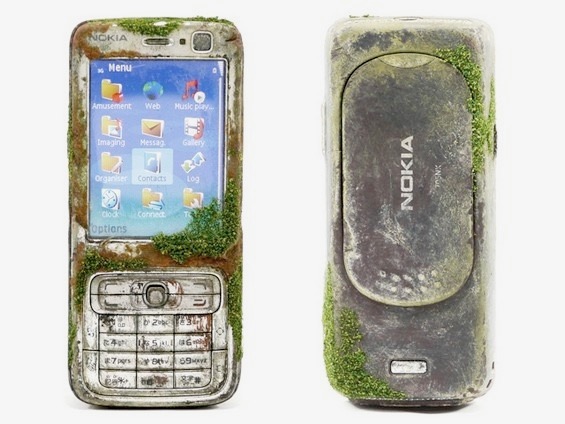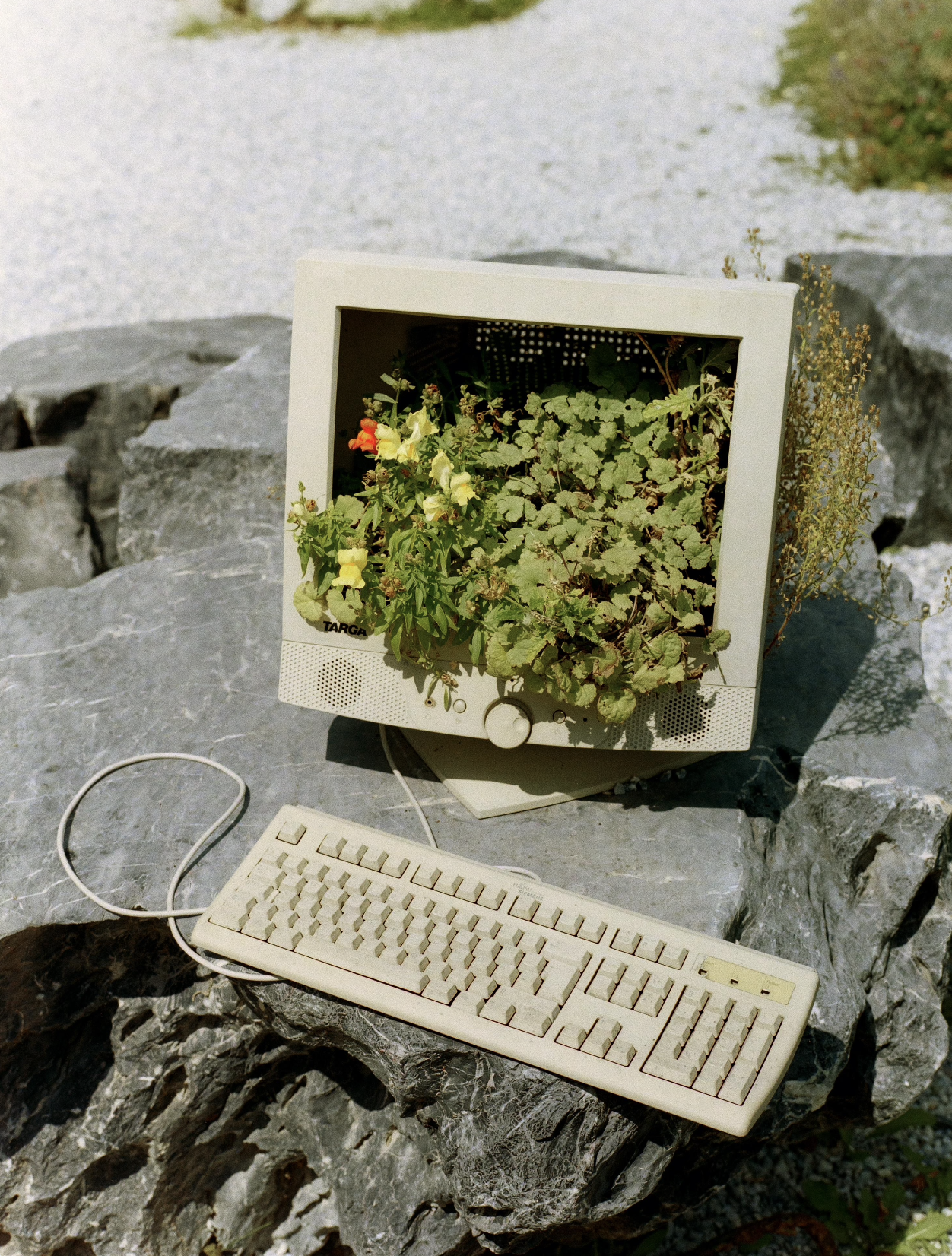
100 Years Later by Maico Akiba
If Social Media Dies, I May Have to Blame Myself for Things Completely in My Control
It is the fear of burnt focaccia, the memories of ninth-grade math class, and the draft of a vulnerable essay that can be charitably referred to as drivel that keep me on Twitter.
By erin gruodis-gimbel
I spend much of my time in the waiting room of writing. I sit in a moderately uncomfortable mental chair, smiling awkwardly at a mental receptionist (the part of me who wishes I was good at math), and wait not for a doctor, but for a coherent thought. I also have a superstition about waiting rooms: the moment I pick up my phone, the doctor will appear. I once spent 10 minutes in an optometrist's chair staring at a photo of a generically handsome family on vacation in Italy. I went on Twitter long enough for three tweets to go by, and sure enough, the patriarch of the generically handsome family came in to poke around in my eye sockets.
I suppose another way of thinking about it is that I spend a lot of time pre-writing. You could also call it procrastinating. I read somewhere that procrastination happens when we are afraid of failing at a task. On the surface, this changed the way I think about delaying projects, but I’m still rather skeptical about why I’m afraid of failing at folding my laundry. As I sit in this mental waiting room, I fall into the same superstition: if I pick up my phone, the thought will come. My luck, sadly, is confined to doctor’s offices. The thought never comes.
Instead, I spend long hours reading about other people watching The White Lotus and wondering why I haven’t (I don’t have HBO), watching women on Instagram decorate their Upper East Side apartments in accordance to the seasons and wondering why I don’t do that (I don’t have any money), and generally feeling bad about myself (which might be cured by HBO and more money).
When Elon Musk bought Twitter, I thought three things. One: I could find a better use for 44 billion dollars, only part of which goes to buying an HBO subscription. Two: perhaps bullying is good, and the problem with our world is not too much bullying, but rather too little aimed at the right people. Three: thank god, as life on Twitter becoming unbearable might be the only way to get me to leave.
To be fair, I should have been able to leave before a megalomaniac took over. I very easily could have deleted Twitter and TikTok, told my friends that if they had an Instagram post to send me that they knew my number, and gone, in a mild sense, off the grid. Maybe then I would be productive.
I probably wouldn’t be. But if I did delete social media, if I did throw my phone in a river and launch my laptop into the sky and write only in a notebook with no interesting sensory details at all, I’d probably fold my laundry instead. I’d blame the laundry, at least for a little while, as an addictive trap of actually knowing what clothes you have and where you put them.
I often think about what my life could be like if I gave up on the trappings of sharing on social media, if I had a landline phone at most. My grandmother would probably take this to mean that since I have a phone that I can’t do anything else on, I’m not calling her because I don’t want to talk to her. (This is not true, I would have forgotten to call, just like I do now).
Maybe in my oodles of free time, I’d take up knitting. I used to know how to knit as a kid, though I was never very good at it, and the scarves I tried to make were always lumpy. I’m still not sure how a scarf can be lumpy, but I managed it.
Perhaps I’d relearn algebra. I was terrible at math, embarrassingly bad, and I’ve always seen it as a moral failing that I cannot be a woman in STEM.
I’ve always said that I wanted to read Infinite Jest in secret, so that no one could see me reading it and assume things about my character. This would be an excellent opportunity.
I’d bake bread and drink water from an unpolluted stream (if anyone knows of any drinkable streams, please reach out), just like nature intended for me. This is most likely not what nature intended for me since I am both Russian and Irish—nature probably intended a life of alcoholism and fun hats for me. We’ll see how the cards fall.
Perhaps it would be time to finally sit down and have the mental space to write anything other than self-deprecating psychoanalyses, actually tell a story that was about anything other than whatever minor and preventable discomfort I am experiencing.
Now, of course, I could do every single one of those things, with the exception of drinking from a stream. Again, if you know of a safe drinking stream, DM me. I’m so desperate that at this point, I’d even settle for a creek or brook. Let me know.
I could do (almost) every single one of those things right now. I have flour; I could bake bread. I could relearn algebra; there’s graph paper somewhere in this apartment. I have enough money to buy a decent pair of knitting needles and some yarn. I could find a copy of Infinite Jest, though I might have the bookseller put it in one of those brown paper bags they sell beer in during the day. Or I could order it online.
I’m not doing any of those things right now, especially not writing about something other than my own discomfort. I am not doing any of those things because I could be bad at them. My superstition about social media allowing my ideas to rise is a front for why I am not distancing myself from online echo chambers and doing things that make me happy outside of the cynical noise of the world. It’s not because social media is addictive or a psyop to lull us into insecure complacency, but because it is easy.
The things that I could do, that I want to do, are not easy. Baking bread is probably the easiest one, and given my poor track record with slice-and-bake cookies, I am afraid it would not go well. It is the fear of burnt focaccia, the memories of ninth-grade math class, and the draft of a vulnerable essay that can only be charitably referred to as drivel that keep me on Twitter.
If I can pretend that being on social media is a superstition about allowing subconscious thoughts to rise to the surface, I never need to confront the fact that the problem is my own.
The problem is that I’m afraid of failing, I’m afraid of being wrong, I’m afraid that if I actually sit down and show that I care, I won’t be good. That the thoughts won’t come no matter what. They won’t come if I pick up my phone, they won’t come if I fold my laundry, they won’t come if I lie in bed and pretend I’m being interviewed at The New Yorker Festival. They won’t come because it’s me, not some grand conspiracy of flashing screens and symmetrical faces designed to keep me docile.
If I blame social media, I never have to improve. If I leave social media, I have to sit with myself. God forbid.
All this is purely hypothetical, of course. I haven’t gotten that far. I’m still in the waiting room.

Photo: Lennard Schmeller
